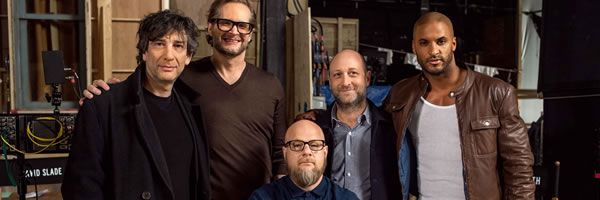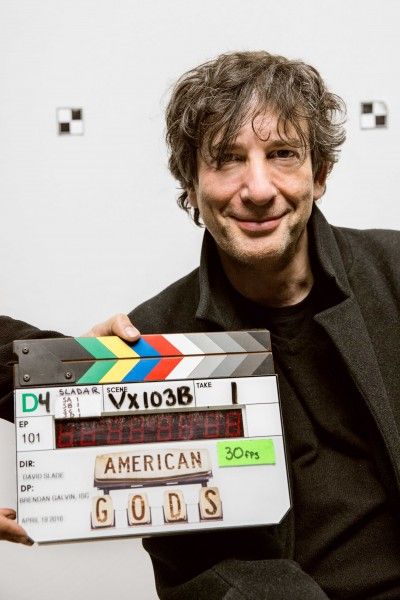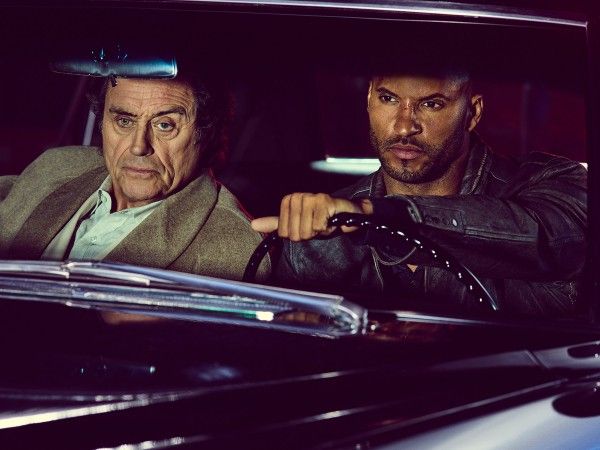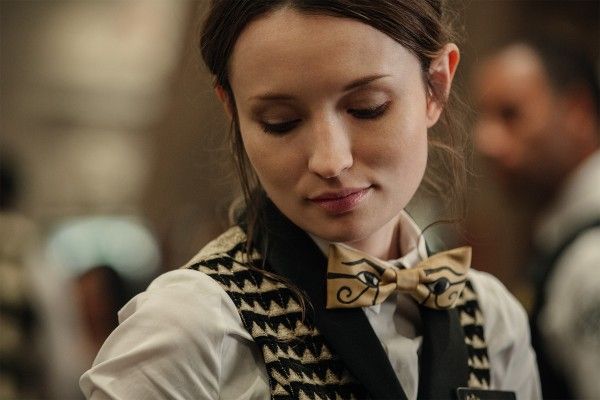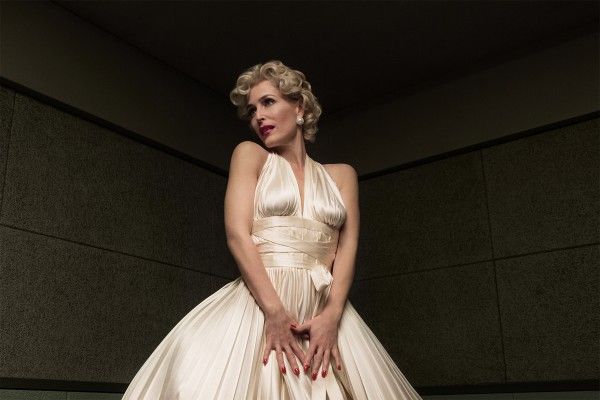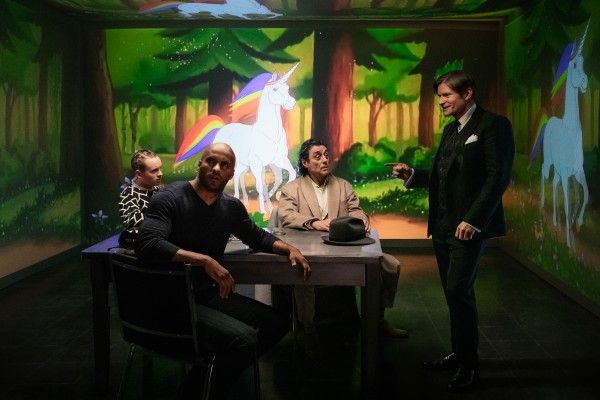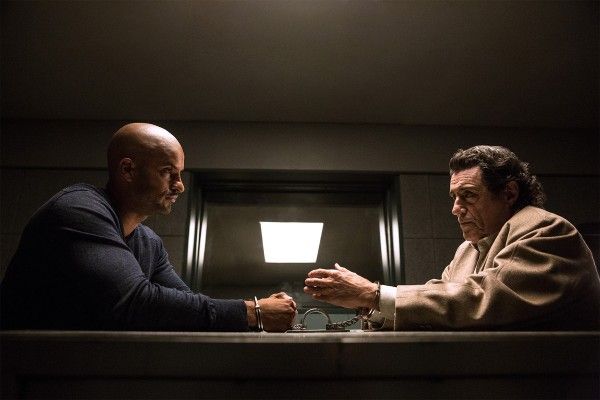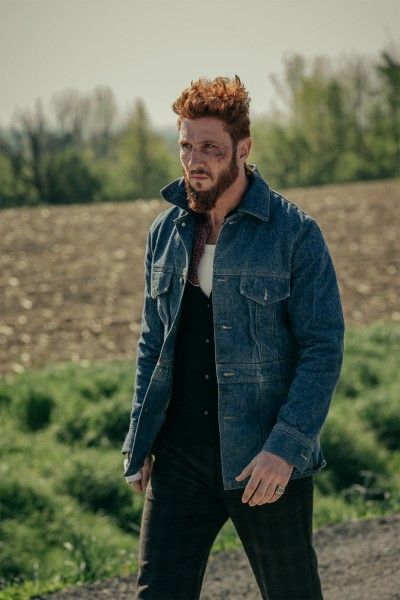From showrunners Bryan Fuller and Michael Green, and adapted from the best-selling book by Neil Gaiman, the Starz series American Gods weaves a provocative tale of faith and belief, or our lack thereof, unlike anything that’s ever been on TV before. When Shadow Moon (Ricky Whittle) is released from prison following the death of his wife (Emily Browning), he meets the mysterious Mr. Wednesday (Ian McShane), with whom he makes a deal that will change the course of his entire life. As he finds himself in the center of a world that he struggles to make sense of, a war between the Old Gods and the New Gods starts to bubble over in ways that are both horrific and mind-blowing, and that you won’t be able to take your eyes off of.
During this 1-on-1 phone interview with Collider, Neil Gaiman (who wrote the book and is an executive producer on the series) talked about why this show couldn’t have existed in any other time apart from now, why the series can never be exactly what he saw in his head when he was writing it, that Ian McShane has now replaced his own vision for Mr. Wednesday, getting to see what the characters in the book were doing when they were off screen, where things are at with the book sequel and when it might come out, letting the showrunners in on what’s ahead for the story and characters, and who he feels is winning the Battle of the Gods in 2017.
Collider: First of all, I absolutely love this show! It’s very exciting that something like this exists, when just a few years ago, it likely could not have.
NEIL GAIMAN: You know, I don’t think it could have existed pretty much any time in human history apart from now, which is amazing. People have said to me, “Why wasn’t this a TV series, back when you wrote the book?!” It’s because you couldn’t put something like this on television without getting arrested. And if you could have, we didn’t have the technology and nobody had the money. You just couldn’t have done it. So, I love the fact that we are living in this strange, brave new world in which things like American Gods can actually get made, and get made by those glorious madmen, Bryan Fuller and Michael Green.
It’s just so great that Starz is not scared of putting material like this on television.
GAIMAN: I love the fact that someone tweeted to me saying that they didn’t remember all of this full frontal nudity, and I remember thinking, “Well, there was an awful lot of blood and an awful lot of nudity in the book. And there was a lot of sex in the book, too, but you may not have actually registered it.”
How close is this adaptation, visually, to what you saw in your imagination? Does it come close, or is there no way for it to ever fully be what you saw in your own head?
GAIMAN: I love the question and it’s one that I get asked, every single time something of mine is turned into a film or into something for TV. I always wind up saying, “No, it’s nothing like the thing in my head,” and then people always look sad. And then, I have to explain that the most faithful adaptations in the world couldn’t be the thing that I had in my head. If I had written, “Two people were having a picnic in a meadow under a tree,” and you picked me a meadow and a tree, it still won’t look like the one in my head. For that matter, if I write a script and direct it myself, and work with the art directors and everybody else, what I’m shooting is not going to be the thing in my head, either. I’m okay with that. What you do is you delight in what your collaborators do and what your collaborators bring. Occasionally, you wind up saying, “No, it really isn’t like that,” or you do what I did with Sandman, over the years, where an artist would do something and you’d go, “Okay, well, you did this thing. Next time, could you do it more like this?” You try to push it towards the thing that you have in your head, but you know that not only do you never get there, you also know that the joy and the magic comes from seeing what other people have in their heads.
Are there any of the actors or actresses on this show that come close to embodying what you felt for their character?
GAIMAN: What’s interesting is that what will probably happen now is that the next time I come to write Wednesday, he will sound a whole lot more like Ian McShane. Ian’s lovely delivery is so amazing that he’s replacing the slightly gruff Wednesday in my head with a much more charming version. You realize that he is a confident man, and you just want to trust him. No matter what else is going on and what else he’s doing, you will trust Ian McShane. That performance has definitely crept in there. For me, the honest joy of it is watching what people bring to things. Did the Laura in my head look like Emily Browning? No, she didn’t. She was taller and paler and had longer, darker hair. Could I imagine anybody but Emily Browning in that role now? No, absolutely not! I love this. That is the strange joy of casting. That is the strange joy of making fiction.
I was so scared about who would be cast as each of these incredible characters, but everyone is doing such a terrific job with bringing them to life.
GAIMAN: That’s how I feel, and that was how I felt when we had the casting. And I love watching characters do things that happened off screen. That is like magic for an author. In the book, they go off screen and you don’t see them until the next time they come on, and you’re not sure what they’ve been doing because you’re wandering around with Shadow. Here, we get to watch Mad Sweeney, we get to watch Laura, and we get to watch characters doing things when we weren’t there. That, in itself, is amazing.
Bryan Fuller has talked about it being important to him to expand the female characters and energy that were present in the novel. What do you think that’s added to the story and how do you think it’s enriched those characters, to see them expanded like that?
GAIMAN: I love it! It was what we hoped. I remember talking with Bryan about Laura, in particular. And I love how he’s taken Bilquis and expanded her role, as well. He decided to bring Easter on earlier and give Media more to do. All of those things make it feel much less like a very male road trip. It’s all stuff that I suspect, had I had another thousand pages, I probably would have done a lot more of in the book, but I didn’t. But, I do now.
Where are things at with the American Gods book sequel? Have you had conversations with Bryan and Michael about whether they would want to use any of that content for future seasons?
GAIMAN: Oh, yeah. I had to tell Bryan and Michael stuff, before they even sat down to write, about future American Gods stuff. I had to say, “Look, here are lines of dialogue that may not seem very important and that may just seem like weird things that characters are saying, but trust me, the entire plot of American Gods 2, including the title, hinges on these lines being there. I’m not even going to be mysterious. Here is information about that. If I’m killed in a horrible road accident, or possibly just killed in an awful baking disaster, you’ll know what this is for and you can keep going.”
Do you know when we might see that book? Are you trying to time it with where things are at in the TV series, or does that not matter?
GAIMAN: It matters a bit less to me. I figure that it’s probably about five years away. On the other hand, we easily have another four seasons from the book. Every time you put down a new piece on the board, you have to build a new piece of board for it. Once we’re following Laura around, now that’s part of the plot. Once we are following all of these characters around, it grows.
In your opinion, who would you say is winning the Battle of the Gods in 2017? Is it the Old Gods, the New Gods, or the Godless?
GAIMAN: I think the New Gods are always winning, but I also think that the tragedy of the New Gods, which we’re seeing right now, is that they also become obsolete very, very quickly. There’s a moment towards the end of American Gods, where Shadow gets to see the Gods of the Telegram and the Railroads, who once were huge and completely dominating this place, but then became yesterday and then became history. If you look at the things that I got to write in American Gods, the old Technical Boy is almost history.
We took an awful lot of Lucy’s speech, in I Love Lucy, from the book for Episode 2 for Gillian [Anderson], but there’s a level at which you’re going, “We’re watching more screens than we ever were before, so that’s true, but on the other hand, broadcast TV is dying.” It’s not dead. It’s just that, right now, you can see that it has some really nasty spots on its back, its color isn’t very healthy, and it’s staggering a little bit. Newspapers, which once were going to live forever, you now look at and go, “Who would have thought that really what would kill you guys would be the death of the small ad?” The arrival of the Craiglists of this world actually killed off the eco system of newspapers. And watching newspapers become more hysterical, in order to get readers, is a strange thing. Web sites, right now, are huge and wonderful, but you start to feel like they may not have long for this world. There’s no social media in the book of American Gods, but what social media will be, 20 years from now, 15 years from now, or 10 years from now, is something that nobody can predict. With the Old Gods and New Gods, there is a dance. The only game that you’re ever sure that everybody on the planet is actually engaged in is a giant game of Cheat the Prophet, where whatever is predicted by sensible people who have looked at everything and confidently predicted the future will be wrong.
American Gods airs on Sunday nights on Starz.

